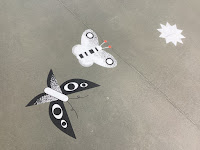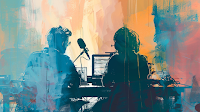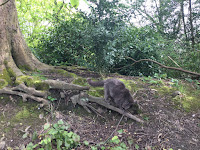My next liveblog from the WILU conference In Vancouver, Canada is a debate: Does AI degrade critical thinking? with the speakers Joanna Nemeth (Managing Librarian, Library Information Services, Athabasca University Library, Canada) and Kimberly Frail (Head, Teaching and Learning, University of Alberta Library, Canada), moderated by Leeanne Morrow (Associate University Librarian, University of Calgary. There was a padlet for comments http://tinyurl.com/AI-panel-comments.
First of all the argument that AI helps to develop critical thinking skills. Creating prompts can help develop creativity and artistic flair. The University of Alberta generative AI guide outlines a CLEAR framework for forming prompts. Also generative AI has led to innovations in teaching, learning and assessment. In an example, a teacher tells students to use AI to create innovative designs for bridges, then students can critique them. There are also specialised AI/bots e.g. the Anne Frank bot, where students can ask questions and critique the output. This could also be used to interrogate people from historical times or collections of literature. You can obviously also ask learners to critique images and text created by AI. I thought that they said that ACRL had sandbox on "Artifical Intelligence", but in fact they were showing the image response to that prompt. However in my misguided attempt to locate the ACRL AI sandbox I discovered this article which has a lot of useful links!
Returning to the speaker's argument: therefore it seems essential for librarians to understand and teach how and when to use AI (being AI literate): guides produced by the University of Alberta were given as examples. This includes guiding people which tools to use for different tasks. The metaphor of AI as chain saw, which is really useful in certain situations, was used. Thus using AI can be seen as a way of sharpening critical thinking.
Secondly the argument was given that AI degrades critical thinking skills. Firstly if you a beginner to a topic you would not be able to spot the biases and misinformation, as you would need to already have a grasp of the subject in order to do that. An example was given of generative AI to identify the name of a real film, and it made up a plausible-sounding but non existent title. The next point was the way AI tried to fit things into neat boxes "data separated out from continuity of experience". It is Google-fying knowledge. Learners might expect that they can find articles that exactly match their topics: in reality it is unlikely to be this simple, but generative AI may come up with something that appears to exactly match their needs (thus bypassing the need for thr learner to reflect and learn, and also the reference might not exist). The speaker also gave a quotation saying that use of generative AI may impair critical thinking and memorisation (I think this might have been based on research).
Then there was a rebuttal phase of the debate. Rebutting the "against" arguments, points included: AI does reflect biases, but it can be used as a jumping off point for information literacy and critical thinking, bringing our biases to the forefront (to be confronted). Of the point about AI destroying cognitive functions: other tools have come along (like calculators, which have been incorporated into people's practice without destroying our cognitive function). Rebutting the "pro" argument, we were asked who didn't use a calculator (answer - everyone in the room used one - so perhaps AI had stopped our ability to do maths). Also there was a point about how not everyone gets exposed to critical thinking training (in fact, at the moment I imagine most people don't?)
We were then asked to respond to a lightening round, but as the link was only in a QR code I didn't participate (my liveblogging device doesn't do QR codes!) Anyway responses were: that AI wouldn't replace human creativity; that people didn't think AI was always reliable and accurate, nor that it understood the consequences of its output. Following this there was a lively discussion about this topic which is obviously going to develop or grow.
Image created by Sheila Webber using Midjourney AI using the prompt: Does AI degrade critical thinking? No cliches there, then!
















